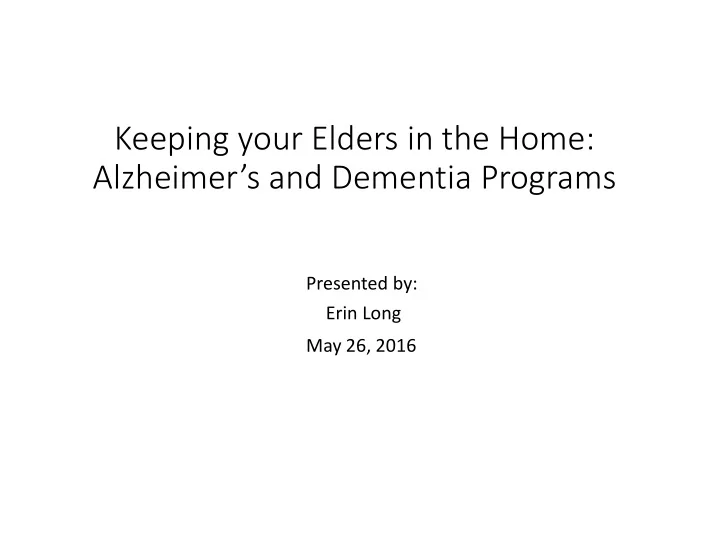

Keeping your Elders in the Home: Alzheimer’s and Dementia Programs Presented by: Erin Long May 26, 2016
Learning Objectives • The challenges of caregiving • ACL Programs to support caregivers in efforts to keep persons with dementia in their homes and communities • Programs examples from Indian Country • Federal Programs funding and partnership opportunities
Challenges of Caregiving • Understanding Alzheimer’s and related dementias • Identifying yourself as a “caregiver” • Adjusting you response to changes in person you are caring for – learning how to identify and respond to challenging behaviors • Adjusting the way you communicate – understanding non-verbal communications – understanding and taking into consideration the feelings, wants and needs of the person receiving care • Responding to your stress and maintaining well-being • Financial challenges • Managing other health conditions (diabetes)
TWO Programs at Administration on Aging/Administration for Community Living Alzheimer’s Disease Supportive Services Program (ADSSP) Alzheimer’s Disease Initiative – Specialized Supportive Services (ADI- SSS)
Alzheimer’s Disease Supportive Services Program (ADSSP) ADSSP supports state efforts to expand the availability of community level supportive services for persons with dementia and their caregivers. Ensure access to a sustainable, integrated long-term services and supports system capable of meeting the needs of persons with dementia and their caregivers to remain independent and healthy in the community.
ADSSP Core Components Create and Sustain a Dementia-Capable HCBS System That Includes Single Entry Point/No Wrong Door Access for People with Dementia and Their Caregivers • Information, Referral and Access • Options counseling and assistance • Person-centered care transitions across multiple settings • Streamlined eligibility determinations for public programs and assistance in applying for these programs
Alzheimer’s Disease Initiative - Specialized Supportive Services (ADI-SSS) Designed to fill specific, existing gaps in dementia capable home and community based services. • Supportive services to persons living alone with ADRD in communities • Person and family centered care and training to improve care for and prepare individuals living with severe ADRD and their caregivers • Programs and services dedicated to individuals aging with intellectual and developmental disabilities with ADRD or those at high risk of developing ADRD • Behavioral symptom management training and expert consultations for family caregivers
ADI-SSS Program Eligible applicants include domestic public and/or private entities that are able to: • Demonstrate the existence of a dementia-capable system dedicated to the population that they serve • Articulate opportunities and additional services that would address three of the four mandated target areas, enhancing and strengthening the existing system. • Organizations with existing ADI grants are not eligible to apply for grants.
ACL ADSSP and ADI-SSS Grants, 2012 - 2015 1 ADSSP grant 2 grants – ADDSP & ADI-SSS 2 ADSSP grants 3-4 grants – ADSSP & ADI-SSS 3-4 ADSSP grants 5-7 grants – ADSSP & ADI-SSS 1 ADI-SSS grant
Wisconsin Tribal Music and Memory Program • Train Family Caregivers to use personalized music to assist in management of behavioral symptoms related to cognitive impairment. • Alzheimer’s Association staff work with state -funded Tribal Dementia Care Specialists to identify persons with dementia and their caregivers that would benefit from the program. • Presently working with 16 caregivers • Oneida, Menominee and St. Croix Chippewa
Wisconsin Tribal Music and Memory Program (con’t) CASE STUDY "Susan ” “She lives alone and experiences a great deal of anxiety and fearfulness each evening and especially at bedtime. She has started using her iPod prior to going to bed these past two weeks. Her anxiety and fearfulness has been greatly reduced and “Susan” is getting much better sleep. We believe the music has helped her greatly just in this short amount of time .”
REACH into Indian Country • R esources for E nhancing A lzheimer’s C aregivers H ealth • Training Program Coaches to help caregivers with: • Problem Solving • Positive Thinking • Stress Management • Shows improvement in Caregiver • Depression • Burden • Frustrations • Reduction of challenging behaviors of person with dementia
REACH into Indian Country (con’t) • FREE Trainings and Certification! • 2.75 CEU Credit Hours • Training is on-line and in person at some locations • REACH IC program certified coaches in Arizona, Colorado, Montana, Michigan, New Mexico, Utah, and Wisconsin • 43 Certified Coaches • 19 Enrolled Caregivers • Serving 29 Communities Ongoing FREE Support for Coaches once certified and enrolling caregivers!
Veterans Affairs Benefits Training COVER to COVER Program Utah’s lead “Veteran Benefit Specialist” have attended over 80+ hours of in classroom and cross-training on VA Benefits. Now a new access point for veterans: • Information on VA Benefits and eligibility • Assist in navigating the application process • Support in preparing documents needed to enroll • Connect to VA partners • Follow-up
Impact to Veterans Joey from Active Re-Entry is currently working with a Veteran in the Navajo Nation. She provides benefit counseling on the following: • Medicaid • Medicaid Waiver Programs • Assistive Technology • Veteran Healthcare Services • Veteran Benefit Programs (financial compensation for low income pension, Aide & Assistance, Disability Service Connection)
Federal Program Opportunities/Resources Think outside the box! • Direct Funding Opportunities • Partnerships • Work that has already occurred that you can build on? • Free Resources • Learning Opportunities
Any questions? Contact Information: Erin Long Erin.Long@acl.hhs.gov National Alzheimer’s and Dementia Resource Center WWW.NADRC.acl.gov PHONE 202.795-7389 U.S. DEPARTMENT OF HEALTH AND HUMAN SERVICES, ADMINISTRATION ON AGING, WASHINGTON DC 20201
Recommend
More recommend